Metaverse promo video
1 sick little monkeys screeched back
4 sick little monkeys screeched back
Just when I was about to write the youth of today’s idea of rock’n'roll off as about as rebellious as a church picnic, the crowd started to raise some hell. Crowd surfers erupted in the pit and the girl next to me tried to climb onto the stage. When security dragged her back down she refused to stand up and had to be physically removed from the building; outside there were cop cars with lights flashing and sullen occupants in the back seat. Clearly, a good time was had by all.Read the rest of it!
17 sick little monkeys screeched back

0 sick little monkeys screeched back
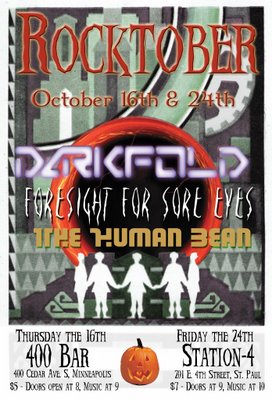
1 sick little monkeys screeched back
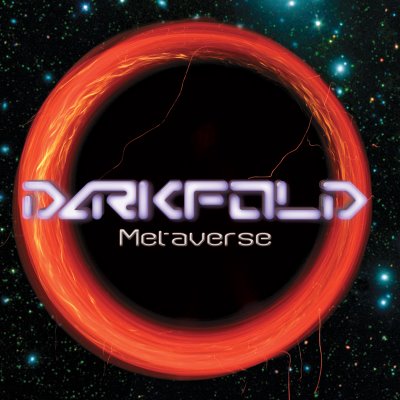
1 sick little monkeys screeched back
Labels: Darkfold, metal, music, oppression, rock
3 sick little monkeys screeched back
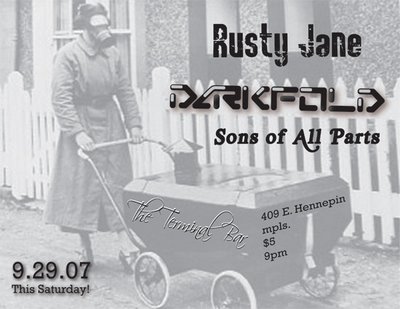 There. Don't you wish I had posted this earlier so you could've gone to see Darkfold lay down the rock? I'm such a bad promoter.
There. Don't you wish I had posted this earlier so you could've gone to see Darkfold lay down the rock? I'm such a bad promoter.0 sick little monkeys screeched back
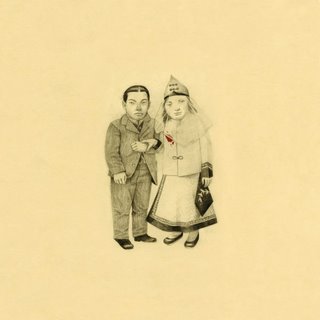 The Decemberists are so fucking literary they sound like a band fronted by your old college English teacher, but in a good way. Despite the focus on words and lyrics (like Dylan) the band is about much more than that. They actually have great tunes! Their sound has been described as progressive-folk rock. They've clearly listened to a few Pink Floyd albums, but also a lot of Dylan.
The Decemberists are so fucking literary they sound like a band fronted by your old college English teacher, but in a good way. Despite the focus on words and lyrics (like Dylan) the band is about much more than that. They actually have great tunes! Their sound has been described as progressive-folk rock. They've clearly listened to a few Pink Floyd albums, but also a lot of Dylan.5 sick little monkeys screeched back
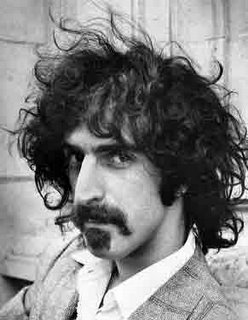 There's an article over on Slashdot that got me thinking. It's about the decline of the CD as a medium. Yeah, an article on that subject comes out every couple weeks, but I didn't even read it. More important, I thought, was the ensuing discussion. It seems everybody has a different take on the state of the music industry. For me, no, CDs are not dead. I prefer my music uncompressed and pre-backed-up before I put it on my iPod. Plus, if you count CD-Rs, CDs are more popular than ever. I burn CDs all the time, whether its a copy of a CD a friend gave me or mixes from my band's recording sessions.
There's an article over on Slashdot that got me thinking. It's about the decline of the CD as a medium. Yeah, an article on that subject comes out every couple weeks, but I didn't even read it. More important, I thought, was the ensuing discussion. It seems everybody has a different take on the state of the music industry. For me, no, CDs are not dead. I prefer my music uncompressed and pre-backed-up before I put it on my iPod. Plus, if you count CD-Rs, CDs are more popular than ever. I burn CDs all the time, whether its a copy of a CD a friend gave me or mixes from my band's recording sessions.Conor: Dark? Not really. Actually I had a great childhood. My parents were wonderful. I went to a Catholic school. They have, I had money, so it was all easy. I basically had everything that I wanted anytimeGee, wouldn't that be nice. If my parents were bankrolling my musical endeavors I think we would've released 5 albums by now. Curse my middle-class upbringing! (j/k) It seems like every other star is the child of someone famous, from Norah Jones to Jakob Dylan. Rock and roll music was sparked by working class kids like the Beatles, the Rolling Stones, and Elvis. Would those same kids have a chance in today's cut-throat economy with all its barriers to entry?
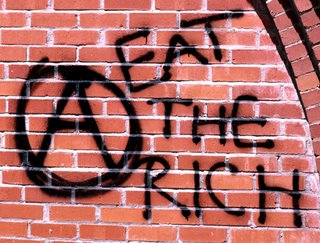 Personally, I get the feeling that we're being fucked. The economy seems to be devised to deprive of us our hard-earned money. After inflation, college loans, housing bubbles, gas prices and the fucked up healthcare system, most people are barely scraping by. I have several friends who are still living with their parents because moving out just doesn't make economic sense. Rent is sky-high and wages are down (even as productivity is up!). Most of my other friends have massive debt (myself included) and no easy way out.
Personally, I get the feeling that we're being fucked. The economy seems to be devised to deprive of us our hard-earned money. After inflation, college loans, housing bubbles, gas prices and the fucked up healthcare system, most people are barely scraping by. I have several friends who are still living with their parents because moving out just doesn't make economic sense. Rent is sky-high and wages are down (even as productivity is up!). Most of my other friends have massive debt (myself included) and no easy way out.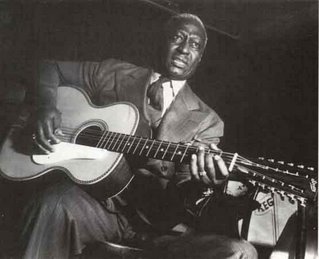 If only rich people are able to make popular, radio-friendly music we'd lose about 90% of all potential music, and we'd be subjected to endless songs about Jacuzzis, Mercedes Benz's and Courvoisier. Thankfully, there are a lot bands out there struggling against impossible odds and making songs about real shit, like trying to pay the rent, finding their way in the world and dealing with relationships. Shit, music used to be the province of poor folks -- look at all those old blues albums. Leadbelly was poor as piss, but now people think there's a lot of money in the music game so the rich's kids have invaded... and conquered.
If only rich people are able to make popular, radio-friendly music we'd lose about 90% of all potential music, and we'd be subjected to endless songs about Jacuzzis, Mercedes Benz's and Courvoisier. Thankfully, there are a lot bands out there struggling against impossible odds and making songs about real shit, like trying to pay the rent, finding their way in the world and dealing with relationships. Shit, music used to be the province of poor folks -- look at all those old blues albums. Leadbelly was poor as piss, but now people think there's a lot of money in the music game so the rich's kids have invaded... and conquered.Labels: Darkfold, inflation, metal, money, music, oligarchy, rant, rock, scam
1 sick little monkeys screeched back
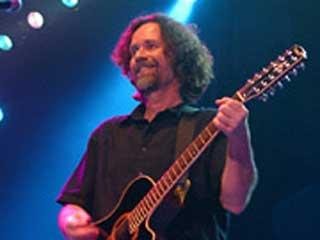 This came as a shock. It's still not clear what caused his death, but it is confirmed that Brad Delp is dead. There are no indications of foul play.
This came as a shock. It's still not clear what caused his death, but it is confirmed that Brad Delp is dead. There are no indications of foul play.0 sick little monkeys screeched back
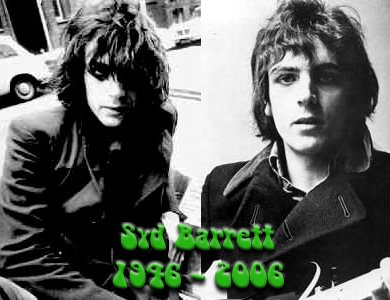
Syd Barrett, the troubled genius who co-founded Pink Floyd but spent his last years in reclusive anonymity, has died, a spokeswoman for the band said Tuesday. He was 60.I'm actually kind of surprised that Syd lived this long. He had long since fried his brain on LSD. Actually, that might not have been the case. Gilmour has speculated that his mental problems were deep-seated and that he would've flipped out either way. In Gilmour's eyes, the drugs just acted as a trigger, although Pink Floyd's sudden fame might have been even more disorienting for Barrett.The spokeswoman - who declined to give her name until the band made an official announcement - confirmed media reports that he had died. She said Barrett died several days ago, but she did not disclose the cause of death. Barrett had suffered from diabetes for many years.
Barrett co-founded Pink Floyd in 1965 with David Gilmour, Nick Mason and Rick Wright, and wrote many of the band's early songs. The group's jazz-infused rock made them darlings of the London psychedelic scene, and the 1967 album "The Piper at the Gates of Dawn" - largely written by Barrett, who also played guitar - was a commercial and critical hit.
However, Barrett suffered from mental instability, exacerbated by his use of LSD. His behavior grew increasingly erratic, and he left the group in 1968 - five years before the release of Pink Floyd's most popular album, "Dark Side of the Moon." He was replaced by David Gilmour.
2 sick little monkeys screeched back
But the Port Keats people were too strong to fully succumb to the church. Autonomous forces survived and, over the past 20 years, gangs have come to steer the undercurrent of life in the town. “They never sleep,” Perdjert says. “They’re always causing problems. Everyone stays up till daylight waiting for them to go to sleep. When the daylight comes, that’s when we sleep.”
On October 23, 2002, after a policeman shot dead a Judas Priest gang member in Port Keats, the JPs – who that day had been fighting the Evil Warriors – turned savagely on anyone with links to the Warriors. Perdjert felt their wrath due to her marriage to Eugenio Kurungaiyi, the deputy commander of the Evil Warriors.
“They [Judas Priest members] smashed my house, all my property, everything. They trashed my washing machine, my deep freezer, DVD and video machine, TV, table, chairs, everything,” she says. “They burned my clothes, mattresses, blankets. I was there.”
It was anything but a casual going over. Twelve houses were destroyed and eight cars burned. The message was clear: the traditional owners of Port Keats were no longer welcome on their own land. “They smashed everything,” Perdjert says. “They smashed the toilet, the sink, the fan, even the power points – everything.”
Six weeks ago, she sneaked back into Port Keats to visit her sick grandmother. But she was quickly found out and Judas Priest gangsters went to her aunt’s home, where she was hiding. Perdjert was punched three times in the head. The boys said they were looking for her husband. Her aunt’s house was trashed as punishment for shielding Perdjert, who immediately chartered an aircraft back to Wyndham.
The Evil Warriors align themselves musically to the heavy metal bands Pantera, Iced Earth and Testament. Outcrops of graffiti across the Top End testify that Pantera’s Cowboys From Hell album is regarded as a seminal work. Iced Earth, a shock-rock band, has albums called The Dark Saga, Dark Genesis and Burnt Offerings. Testament album titles include Demonic and Signs of Chaos, all of it suggesting the gangs rejoice in concepts forbidden and reviled by the church.
The Judas Priest boys take their name from the leather-and-chain British band. Metallica, the band that screams against injustice over studiously disjointed machine-gun bursts of sound, is also rated highly by JP. Both groups reject the other’s music as crap.
Beneath the two dominant gangs are sub-gangs with names like the Lica (from Metallica) Warriors, Mad Warriors, Fear Factory, Big T (taken from the band Testament), the German Punks, the White Lions and the Cowboys From Hell – a small group of young boys from just up the road at Palumpa. They are variously aligned to the two main groups.
“These smaller gangs,” says a lawyer with experience in the area, “represent the small Port Keats family groupings or clans that aren’t terribly powerful. They form their small gangs almost as a defence against the larger family gangs but inevitably they need to align themselves to the bigger groups.” In a power switch that came after October 2002, when the Evil Warriors lost influence in Port Keats, most of the smaller gangs got onside with Judas Priest as a matter of survival.
Wyndham exile Peter Cumaiyi confirms the lawyer’s assessment. “The reason why they’re in a gang is to protect themselves from other gangs,” he says. While his sons and nephews are members of the Evil Warriors, Cumaiyi, 47, insists he is too old to be in the gang – even though, when it comes down to it, he has stood alongside his boys and fought Judas Priest.
For a start, these are bush kids who don’t speak English well enough to explain themselves. The church sent their parents – like Cumaiyi – to Catholic boarding school in Darwin. But then came the era of self-determination, which demanded the church move aside so that Aborigines could do things for themselves. What in fact happened was that a whole generation – these very boys – fell into a vacuum. They got to grade six and seven then disappeared into the bush.
They deal with problems the best way they know how – through confrontation, using their clan numbers, or forming allegiances with others, much as their ancestors did. But their life as bush gangsters has bitten back.
So you can actually trace much of this back to the Catholic Church's insistence on "christianizing" the Aboriginal population. Interesting... The Aboriginal youth were probably warned by the church that heavy metal was evil. So naturally, when the church lost control, the youths embraced that which they had been denied. It's very interesting, but it's too bad that it's degenerated into a series of tense, violent, stand-offs with white settlers and each other.
I can assure you that most of the bands mentioned in the article kick ass. I'm sure they would not want to see such destruction in their name. But they understand oppression, as do the gangbangers:
When they first emerged in the 1980s, the gangs were not seen as a threat. Because each gang is tied to one of the region’s 20 clans, or wider family groupings, it was thought the boys had simply updated clan names along contemporary lines. Recent events have forced a reappraisal.
“The music they’re listening to is the music of the oppressed and disadvantaged and these kids really heavily identify,” the lawyer says. “It’s anti-authority, angry, violent and rebellious and these are sentiments a lot of Aboriginal people can identify with. I’m no musicologist but that’s what it seems to be. You just better hope they don’t find Islam.” The lawyer pauses and adds: “I think I’m joking.”
The best way they can explain the love of heavy metal is, in the words of Francis, the “inspiration” it gives them. It needs no beer or ganja to kick it along. He says the music “works” when they are sitting at their outstations, bored and in search of a shared muse. Most like to be seen wearing Kmart-issue camouflage gear they pick up on occasional trips to Darwin. The militia costume would appear to send the message that the boys are combat-ready at all times.
By and large, Port Keats men have lean, hard-cut physiques, with veins that rope in their biceps and powerful shoulders. The boys are careful to highlight these features in spray-on clothes. The men of Groote Eylandt, off Arnhem Land, and the Walpiri tribesmen of the Tanami enjoy their reputations as hard men. But for the men of Port Keats – nowadays the most jailed people of any NT community – a special respect is reserved.
Blending the symbols of hard-edged western cultures, gang members – perhaps surprisingly – prefer the angry guitar sound of white metal bands to the tempered black ghetto beat. Rap music, they say, is for kids – even though the shot-dead gangster-musician Tupac Shakur is singled out as an affectionate exception.
They reject the idea that the allegedly demonic nature of the metal bands puts them in the Devil’s hand. “We can be Evil Warriors and we can still go to church,” says Gerard Cumaiyi. “We go to church every Sunday here in Wyndham. We are strong believers. It’s that mob [Judas Priest]. They don’t believe. They never go to church.”
Wow. I think these kids need to get into reggae music, mon. Bob Marley, man. They need to get that aggression out. I think they still need the heavy metal. It provides solace in a world of shit. But reggae offers sunshine, even in the depths of oppression and cruelty. As this article makes clear, skin color doesn't matter. Music speaks to you, and sound doesn't have a color.
Shelvey is far from pleased that JP have the upper hand in his town. “All sorts of people in Wadeye are absolutely shit-scared of him getting out,” says an observer. “The Jongmins, as a matter of pride, would say bring it on – but it’s the women and kids generally who are afraid of being caught in the crossfire.”
The Wyndham-based Evil Warriors say they are depending on Shelvey to lead them back to Port Keats. “What the boys are suggesting,” says Gerard Cumaiyi, “is that we need a fair fight with them [Judas Priest] and then there might be peace.” After that, he says it’s over. “We want no more Evil Warriors, no more Judas Priest, no more gangs. We’ll settle down with true family.”
Gerard is asked if he hates the boys from Judas Priest. “We don’t hate them,” he says. “They’re the same mob as us – same language, but different country.” “It’s very hard,” says Peter Cumaiyi. “They can be right, we can be right. It’s a seesaw. Who is right? Which way does it go? We just want to be equal.”
Much of it comes down to how young Port Keats men see their place in the world. They have all been through manhood ceremonies and many have known the inside of Berrimah prison. Yet they are so strongly connected to ceremonial business that other communities rely on Port Keats people to guide them through correct ceremonial performance.
It's a cycle of violence, as they say. And not much good comes of it. Can't they get together and put this feud asside? Probably not. The warring gangs each have families where the rule is concentrated, and they get their power through conflict. We should not expect to see an end to this conflict as long as it is so profitable (power-wise) for certain gang families.
The ending is hopeful, however:
Same for the heavy metal gangster culture. These young warriors will fight, will go to jail and will go to jail again for their clans. But they are not beyond reach. There is none of the lethargy among Port Keats people that so demoralises many others. The boys are feared by other communities, seen by the cops as trouble, but are nevertheless warm and intelligent and would surely prefer to be doing more than fighting each other. As such, the heavy metal scene could be read as an attempt to engage in the world beyond their fishbowl existence in a community at the end of a long, dirt road. In a startling admission, it turns out there are Elvis Presley and Hank Williams lovers hiding beneath the furious wall of sound. “Yes, we like angry music,” says Gerard Cumaiyi. “But we also like the crooners.”
Good to know they're finding other good bands and singers. They need to spread their wings and find the good that exists in all kinds of music. Maybe then they can learn to appreciate the good that exists in all kinds of peoples throughout the world.
Labels: Christianity, crime, metal, music, religion, rock, war
1 sick little monkeys screeched back